- Home
- Cecelia Ahern
Postscript Page 9
Postscript Read online
Page 9
I nod along, letting it sink in. I can understand his concern but I’m thrown by his anger. Perhaps it is difficult when the person you know becomes caught up with the person she was. We’ve been together for two years, two intense years during a profoundly transformative time in both of our lives, when everything around us was a big enough excuse for us to pull us away from each other, and yet we kept returning to each other for more. My heartache, my grief, his self-prescribed loneliness, our fears and trust issues. We overcame all of that, still do, to make each day work. Moving in together is something we both thought we would never do. Him because he never wanted to live with another woman again, me because I thought I could never love another man with the same intensity.
‘You’ve spent the past few weeks creeping around like you’re seeing someone else. I knew something was up – you should have told me, Holly.’
‘I wasn’t creeping around,’ I say, annoyed. ‘And fine, if it’s going to agitate you so much, I won’t help them.’
‘Oh no no, don’t put that on me,’ he says, reaching into his pocket and searching through his money to pay the bill. ‘You did the podcast for Ciara, and you’re not helping this club, for me. Take ownership of something, Holly.’
He throws the money on the table, and leaves.
Cycling home, the pressure has intensified. Choosing not to help the club would relieve me of the constant stress of thinking about the club, but I don’t think I’d be able to stop thinking about Joy, Bert, Paul, and Ginika. I wouldn’t be able to stop myself from wondering what they’re doing, how they’re getting on. And Jewel. Would Ginika swallow her pride again and ask for help from someone else to write her letter? I don’t know.
There’s a loud angry car horn. I feel a hard thud against my right leg and I can’t control my bike. I’m forced over and crash to the ground.
Screams, shrieks, yells, a car horn long and loud, ringing in my ears. The car has stopped, the engine is still running. The car horn finally stops. I lie on the ground, my heart pounding, my leg throbbing. I see a lone shoe on the ground nearby. My trainer. There’s a heaviness on top of me and I think it’s the car, that it’s above me and I’m trapped. It’s a moment before I realise it’s my own bicycle.
After the cacophony, there’s a stunned silence.
A car door slams shut. The yelling begins again; angry this time. I brace myself. My body feels contorted, but I don’t dare move. I close my eyes. My nose touches the cold concrete. I try to steady my breathing, try to stop my heart from ripping out of my chest, feeling crumpled.
I know death. Death knows me. Why does it keep following me around?
13
The taxi that hit me had suddenly veered dangerously to the left to avoid hitting the car in front, which had braked hard for a right turn, without indicating. He successfully managed to avoid hitting the car in front but hadn’t checked his mirror to see me in the cycle lane. In my fall, I fractured my left ankle, and scored plenty of bruising to my body as I hit the ground. Helmet on, my head is fine. I also got my shoe back.
‘I love you, I love you, I love you,’ Gabriel murmurs in my ear in the hospital, comforting warm whispers over and over again, in my ear, on my lips, showering my face, my body, with butterfly kisses, as I fall into the deepest of exhausted sleeps into the same dream that has been in replay mode.
I’m lying on the hard concrete, around me is shattered glass, a battered car, a twisted and mangled bicycle. I somehow manage to stand up and the glass crunches beneath my feet. I find a single trainer. The road is filled with empty cars. Where has everyone gone? I circle car after car with a single shoe in my hand, trying to find its matching pair. Over and over again I find the same single shoe. I’m exhausted; I’ve been doing this for hours. I search again, going round and round the cars, one after another; it is dizzying, the trainers I find are identical, always for the same foot. But I cannot match a single pair of shoes.
I wake up sweating and panting, heart pounding, confused by my surroundings. Mum is beside me and starts talking to me, calmly, softly, but my mind is still half-trapped in my recent nightmare. I look around, trying to orientate myself. I’m home. It’s my childhood home, where I grew up. I’m in my old bedroom, where I cried, and dreamed, plotted, planned and most of all waited, waited for school weeks to go by, for summers to begin, for boys to call me, for my life to begin. Mum and Dad had insisted I stay with them for a few nights after I was released from hospital.
‘Are you OK?’ Mum asks.
‘I thought I was dead.’
‘You’re safe, sweetheart,’ she says softly, gently brushing my hair back from my forehead, then her lips graze my skin.
‘For a moment, when the driver came over to me, and was asking me over and over again if I was OK, I kept my eyes closed, like I was pretending to be dead,’ I explain.
‘Oh love.’ She wraps her arms around me and I rest my head on her chest. There is only one way that I can lie in bed, with a cast on my broken ankle.
‘Possum,’ Dad says, out of nowhere.
I look up and see him standing at the door, with bedhead tousled hair that I haven’t seen for so very long. He’s wiping his glasses on the ends of his vest, before placing them over his sleepy eyes that get larger as soon as they’re behind the lenses. He steps into the room and sits at the end of the bed. My parents, back at the same scene where they settled my childhood nightmares. There is something comforting about this, that no matter how much the world changes, no matter how much our relationships with others alter, they still are who they are to me and always will be.
‘Playing possum, or apparent death, is a behaviour in which animals take on the appearance of being dead,’ Dad goes on. ‘It’s a form of animal deception also known as tonic immobility, whereby animals become apparently temporarily paralysed and unresponsive. It occurs during an extreme threat such as being captured by a predator. The same thing can occur in humans undergoing intense trauma, whereby they freeze in response to life-threatening situations. I watched a documentary about it.’
‘Oh.’
‘Frank,’ Mum says, annoyed by his response.
‘What? It’s perfectly natural, is all I’m saying,’ he says.
‘Well then why don’t you just say that? I don’t think she needs to be listening to a lecture on possums at a time like this.’
‘All right, all right,’ he says, hands up in defence.
I smile, then laugh, laying back on the pillow as I listen to them bicker.
But Dad might be on to something.
Even though I want to go straight back to work, Ciara gives me the week off. I’m a little woozy from the painkillers and as Gabriel has to work, Mum and Dad insist I stay on with them until the pain in my leg has lessened, I get to grips with my crutches, and my fear has subsided. I lie in bed some days, daydreaming, watching daytime TV. Other days I move to the couch to do the same. I spend time with my family: a painting session with my mum, watching nature and history documentaries with my dad, who narrates the entire thing, listening to Declan’s new documentary ideas with time to guide and listen and advise, overseeing planting in Mum and Dad’s garden with Richard, interrogating my nieces and nephews about their lives, playing Snap with Jack, being comforted by Gabriel.
I seek solace, I seek solitude, I seek company, I search for me. I long to go for a cycle and realise how much I had used movement and doing as a way to not think. I was the friend I avoided because I didn’t like the topic of conversation; too close to the bone. It may have been necessary for a spell, to get myself out of my head, but for now I have to get inside my head, make myself comfortable. There are thoughts to be processed, actions to analyse and decisions to be made. For once, I can’t run from me.
I descend the stairs on my bum on a Thursday morning, which since Dad has retired feels very much like a weekend in my parents’ home. I reach for my crutches at the bottom of the staircase, and swing my way into the kitchen. They’re both sitting at th
e kitchen table. Mum is wiping her teary eyes, but she’s smiling, and Dad’s face is a picture of emotion.
‘What’s wrong?’
‘Nothing’s wrong.’ Mum puts on her reassuring voice and pulls out a chair. ‘Come sit with us. Your dad found something.’
I sit with them and notice an open shoebox on the table. Piles of folded pieces of paper fill each one.
‘What are these?’
‘Do you remember?’ Dad begins, but his voice is shaking and he clears his throat. Mum places a hand on his cheek and they both laugh. ‘Do you remember when you were younger and I had to travel for work?’
‘Yes, of course I remember. You used to bring me back a bell, every trip. I had dozens of them.’
‘I hated flying,’ Dad says.
‘You still do.’
‘It’s simply not natural,’ he says firmly. ‘Humans were made to be on the ground.’
Mum and I laugh at his deathly serious state.
‘Well, every time I had to get on one of those awful things I was sure the plane would go down,’ he says.
‘Dad!’ I say, surprised.
‘It’s true,’ Mum says, grinning. ‘It was more stressful dealing with your dad going away than it was with you all missing him.’
‘Every trip where I had to get on a plane, I’d sit down the night before and write you all a note. In case the plane went down and I never got to speak to you again. I left it in the drawer beside my bed with strict instructions to Elizabeth to give you the messages.’
I look at both of them in surprise.
‘He didn’t leave me any letters, mind you,’ Mum says, teasing.
‘It’s not the same thing as Gerry did for you, not the same thing at all. I never equated my little notes with Gerry’s letters. I didn’t even use envelopes. But I kept them. I just needed to put in words all the things I would want to say to you if I wasn’t here. Guiding words for your life, I suppose.’ He slides a shoebox towards me. ‘These are yours.’
‘Dad,’ I whisper, looking into the box. ‘How many are there?’
‘Fifteen or so. I’m sure I didn’t write one for every trip. I didn’t feel so scared going on short flights to the UK. But the longer letters were when I was getting on a propeller plane.’
Mum snorts with laughter.
As I lift the envelopes from the box and flick through them, Dad adds, ‘I thought they might be helpful to you now. To help you make your decision.’
The lump in my throat is so enormous I can’t speak. I stand up to reach over and hug him, but I put my weight on the wrong foot.
‘Ow, fuck,’ I groan, sitting down again.
‘All these years, and that’s the response I get,’ he says, amused.
Crouched with Dad around the letters at the table, with a box of my collection of bells that Mum retrieves from the attic, I choose one at random. Dad opens it and inspects it. I can tell he’s enjoying the game of retracing his past.
‘Hmm, let’s see. Barcelona trip. Sales Conference with the horrifically foul-breathed Oscar Sheahy, who had more time for escorts than meetings.’
I laugh and search through the bells. A tiny porcelain black-handled bell with a cathedral and sunset sky. Barcelona is hand-painted in white around the base. I tinkle the bell and Dad hands me the letter. I read aloud:
Dear Holly,
You’re six years old this week. I’ll be travelling for your birthday and I just hate it. You’ll have a clown party. I hope it doesn’t scare Declan, he hates clowns and kicked one in the goolies for Jack’s party. But you love them. You dressed as a clown for Halloween this year and insisted on telling a joke at every door we knocked on. ‘What do you call a zoo with only one dog?’ you asked Mrs Murphy. ‘A shih-tzu.’ You love telling that one.
I’m sorry I’ll miss your birthday, this very important day of your life, but I’ll be thinking of you all the time. I didn’t want to leave you on this very special day but Daddy has to go to work. I will be with you all the time, even if you don’t see me. And please remember to keep me some birthday cake.
Lots of love,
Daddy
‘Oh Dad.’ I reach across and take his hand. ‘That’s so lovely.’
Mum is standing by the kitchen sink, listening. ‘That was the day Jack jumped off the roof of the shed and cracked his two front teeth.’
We look up at her in surprise.
‘And I ate all the birthday cake,’ she adds.
I stalled after Gerry’s death. His letters got me back on my feet again. The following year I began to cycle and I’d been pedalling fast ever since. But now, I must be still, and learn to walk again. It is this simple quality of life and rhythmic functioning, almost like a production line, that gets me thinking: I’m equally terrified by life and ecstatic to be living it at the same time.
I selfishly thought after Gerry’s death that the universe owed me. I experienced a great tragedy at a young age and I thought that was me done, I got it over and done with. In a world of infinite possibilities, I should have known there is no end to the loss that we can experience, but neither is there to the knowledge and growth that arises because of it and in spite of it. Now I think surviving the first prepared me for the second, for this moment, and for anything else that lays ahead. I can’t stop tragedy from unfolding, I am powerless in the face of life’s sleight of hand, but while I lick my wounds and heal, I tell myself that although the car knocked me off my perch, momentarily tore my confidence, ripped me raw and broke my bones, I’m healing and my skin is growing back thicker.
My mind sent an SOS to my roots. This is what my roots have come back with: my unravelling at this time could be the making of me. After all, it happened once before, so why can’t it happen again?
Once upon a time I wanted to die.
When Gerry died, I wanted to be dead.
When he died, a piece of me did die, but a part of me was born too.
But in the midst of my grief, if I had been faced with a speeding oncoming car, I would have wanted to live. Perhaps it is not death that angers or scares us, it’s the fact that we have no control over it. Life cannot just be taken away from us without our consent. Given time, and our permission having been granted, we would accept our fate and plot our own timely deaths. But we can’t. All of which thinking brings me back again and again to the PS, I Love You Club.
Play dead to survive.
Play at living while dead.
We want to control our deaths, our goodbye to the world, and if we can’t control it, we can at least control how we leave it behind.
14
Gabriel is quiet at breakfast. I arrived at his house late last night, just as he was going to bed, and I joined him, thankful there were no stairs to negotiate. At my parents’ home I’d been going upstairs on my bum nightly like Gretl von Trapp singing ‘So Long, Farewell’. We didn’t talk, at least not about what we last argued about, and then I slept, Gabriel didn’t. I could tell each time I opened my eyes and found him sitting up reading through his phone. Either my accident has affected him deeply, or our argument, or I’m being naïve and there’s something else on his mind. He stands at the island, naked from the waist up, concentrating intently on his boiled eggs.
‘Are you OK?’
He doesn’t answer.
‘Gabriel?’
‘Hmm?’ He looks up.
‘Everything OK?’
‘My boiled eggs are hard,’ he says, studying them again. His toast pops. It’s burnt. He sighs dramatically, joking, ‘It’s going to be this kind of day.’
I smile. He butters the toast, sending cremated crumbs all over the counter.
‘You’re going to help the PS, I Love You Club, aren’t you?’ he says, sensing my thoughts.
‘Yes.’
He’s silent. He moves his boiled eggs and toast to the breakfast bar at the edge of the island and sits on a high stool. Calm face, busy head. He picks up the toast that’s been cut into neat soldiers and dips it into
the egg. The toast bends. It doesn’t dip into the yolk as he likes, doesn’t send it oozing down the side of the shell and cup for his finger to wipe and lick.
‘Fuck,’ he says angrily, and drops the toast.
His outburst gives me a fright, though I was dreading this reaction from my usually cool-headed boyfriend.
‘I have to get dressed,’ he says, then makes his way to the bedroom.
‘Don’t you want to talk about it?’
He stops midway. ‘You’ve already decided. I’ve figured you out. Long silences and not talking for months on end means you’re making your own decisions. That’s fine, that’s how you and me will function from now on. Let’s just do our own thing and let each other know after.’
He disappears into the bedroom. As I am breathing out slowly, he appears in the doorway to the living room, top still off. ‘Not so long ago you got hit by a car, Holly, probably because you were thinking about this club and weren’t paying attention to what you were doing. You shouldn’t make rash decisions after something like that.’
‘It’s not rash. It was over a week ago, and sometimes frights make you think faster, with more focus. I can see it more clearly than ever. There is absolutely no reason why helping them would make me revert to who I was. It’s an entirely different set of circumstances. I can help them. And anyway, the accident wasn’t my fault, the taxi pulled out, I couldn’t have avoided it.’
‘What did you tell me the night you came home from the podcast? If I ever decide to do this again, stop me. I remember that, you might not. You’ve been through enough. God knows what the hell you’re thinking after what happened to you.’
‘I think that this will help me.’
‘You’re doing this for you? Or for them?’
‘For all of us.’
He throws his arms up. ‘You almost got run over by a car!’
‘It bumped me. I hurt my ankle, not my head! But at least my recuperation has given you more time to spend with Kate and Ava,’ I snap.
My catty response is not quite how I wanted to mention the amount of time Gabriel has been spending with his daughter and ex-wife since the accident. I shouldn’t throw it at him as a negative because I know time with his daughter is what he’s been craving since I met him. Though it was my decision to stay with Mum and Dad for the week, it grated on my nerves a little bit more each time he was out with them.

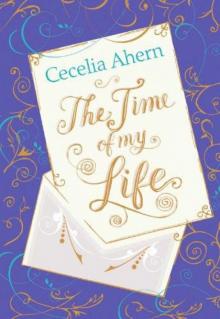 The Time of My Life
The Time of My Life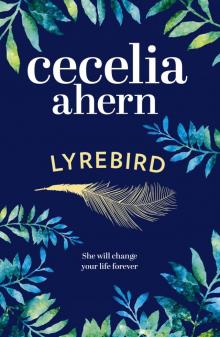 Lyrebird
Lyrebird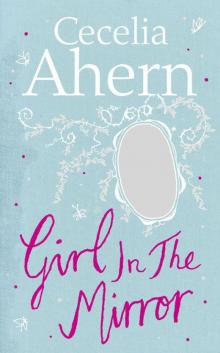 Girl in the Mirror
Girl in the Mirror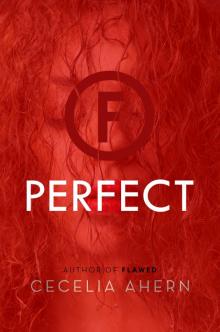 Perfect
Perfect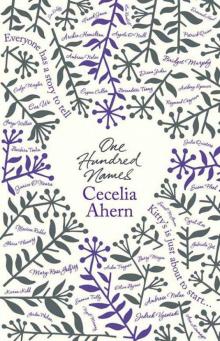 One Hundred Names
One Hundred Names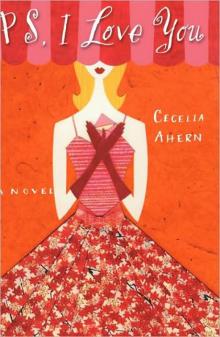 PS, I Love You
PS, I Love You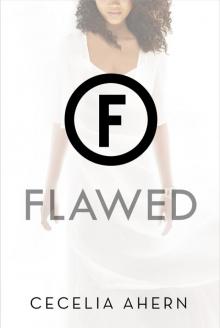 Flawed
Flawed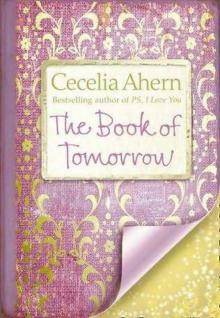 The Book of Tomorrow
The Book of Tomorrow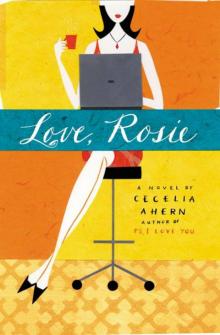 Love, Rosie
Love, Rosie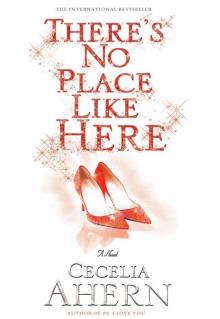 A Place Called Here
A Place Called Here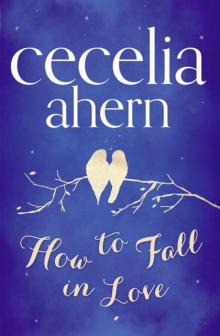 How to Fall in Love
How to Fall in Love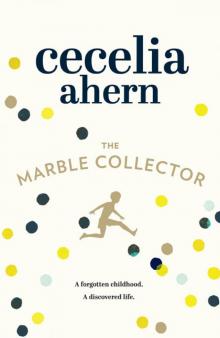 The Marble Collector
The Marble Collector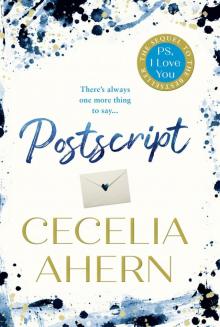 Postscript
Postscript The Gift
The Gift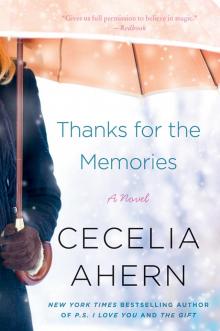 Thanks for the Memories
Thanks for the Memories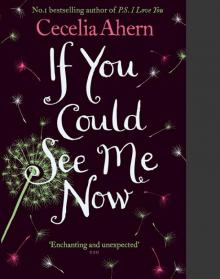 If You Could See Me Now
If You Could See Me Now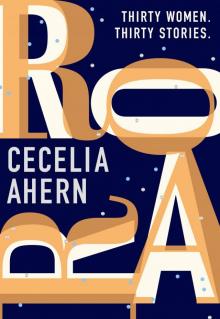 Roar
Roar Cecelia Ahern 2-book Bundle
Cecelia Ahern 2-book Bundle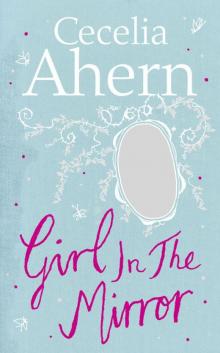 Girl in the Mirror: Two Stories
Girl in the Mirror: Two Stories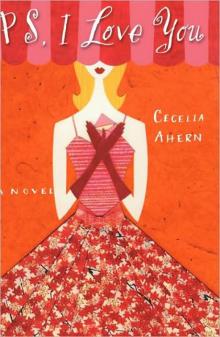 PS, I Love You: A Novel
PS, I Love You: A Novel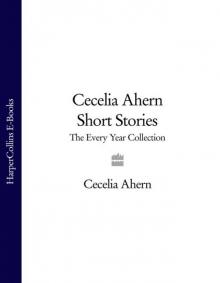 Cecelia Ahern Short Stories
Cecelia Ahern Short Stories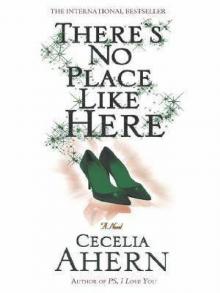 There’s No Place Like Here
There’s No Place Like Here